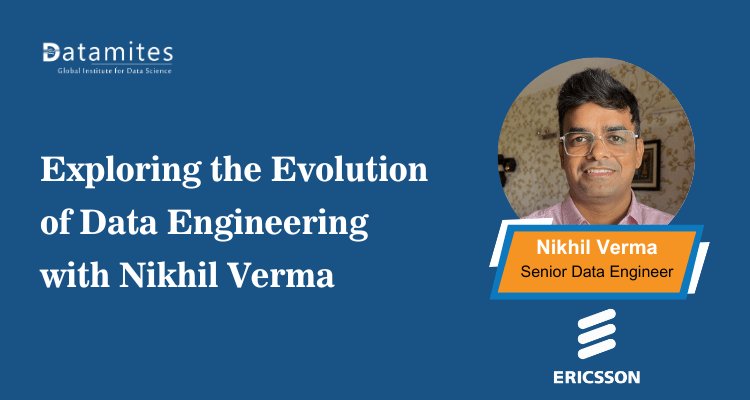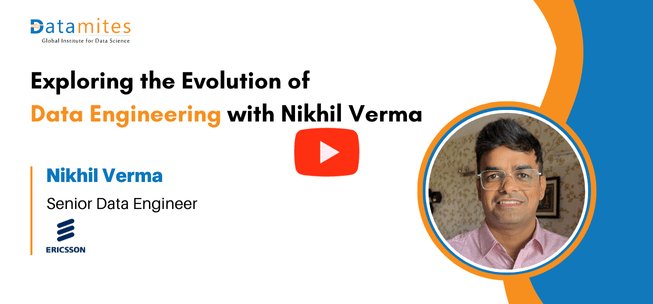Exploring the Evolution of Data Engineering with Nikhil Verma
A deep dive into how data engineering has evolved, featuring insights from Nikhil Verma on modern tools, workflows, and the future of scalable data systems.

Data science and engineering are rapidly evolving, and navigating them successfully requires technical skills, hands-on experience, and continuous learning. We recently hosted Nikhil Verma, a senior data engineer with over 13 years of experience, for an insightful alumni talk. In this article, he shares his career journey, learning strategies, and advice for aspiring data engineers and data scientists.
From mastering foundational skills to working on advanced AI/ML applications, Nikhil’s experience shows how targeted learning and practical projects can drive growth and shape a successful career at the intersection of data engineering and machine learning. To explore more inspiring journeys like his, you can watch DataMites success stories and see how structured training transforms careers.
How Nikhil Built His Career as a Senior Data Engineer with DataMites
See how Nikhil advanced to Senior Data Engineer by combining structured training, practical projects, and on-the-job experience.
1. Can you briefly walk us through your career journey?
I started as a data engineer at Oracle, then worked at a startup, JP Morgan Chase, and now at Ericsson R&D. Initially, I focused on ETL pipelines, Big Data, and Spark transformations. Later, I transitioned into machine learning engineering, building end-to-end ML pipelines for AI/ML applications.
2. What motivated you to move from data engineering to machine learning?
In my current organization, there was a push towards AI/ML. I already had a strong data engineering background, so I decided to take a structured data science course to gain foundational AI/ML knowledge and move into a machine learning engineer role.
3. Which course did you take to transition into machine learning?
I enrolled in a six-to-eight-month Data Science course from DataMites, which included classroom sessions, capstone projects, and the IABAC certification.
4. How did your previous programming experience help?
I had prior experience with Java and Python. Since Python is extensively used by data engineer and data scientists, it was easier for me to adopt AI/ML coding practices. The course also covered basic Python and Pandas, so you don’t need to be an expert to get started.
5. How important is foundational knowledge in data science?
It’s crucial. Understanding the basics of data science, features, model training, regression, and classification is necessary before moving to advanced fields like NLP, generative AI, or deep learning.
6. What are the key skills for a data engineer today?
Handling large data volumes, understanding Spark or Pandas for transformations, optimizing performance, and integrating pipelines with orchestration engines are critical. Data engineers also need a basic understanding of AI/ML since data often feeds ML models.
7. Can you suggest resources for learning data engineering?
Online platforms like Udemy and Coursera are good starting points. YouTube tutorials can also help. Start small on your laptop and scale learning as you encounter larger datasets in projects.
8. What about resources for aspiring data scientists?
Classroom courses like DataMites provide a structured, interactive learning environment. They cover basics, statistical analysis, EDA, transformations, regression, classification, and more, providing a solid foundation to build advanced skills.
9. How did the internship and capstone projects help?
We worked in small groups on multiple capstone projects, applying all concepts from the course. This gave us a simulation of industry experience. Even small datasets taught us how to debug, present, and deploy ML solutionsskills I still rely on today.
10. Did the IABAC certification add value?
Yes. It reinforced our understanding of ML concepts and problem-solving approaches. Even today, I refer back to my capstone project notebooks for guidance.
11. What trends do you see in data engineering and data science?
Big data handling, cloud migration, AI/ML integration, and low-code approaches are trending. Spark is particularly important for handling large-scale transformations efficiently. Data quality and enrichment remain critical for ML outputs.
12. How can someone with Python experience transition into data engineering?
Learn PySpark or Spark for processing large datasets. Focus on understanding internal workings and performance optimization in Spark. These data science skills are in high demand.
13. What tips do you have for keeping up with new technologies?
Passion and curiosity are essential. You need to actively follow trends, explore online courses, and dedicate time to learning beyond your day-to-day work. Companies adopt new tech gradually, so self-driven learning is key.
14. How does low-code AI/ML affect the learning curve?
Low-code tools simplify model training and deployment. For example, even without deep Python knowledge, you can leverage platforms and generate models by creating effective prompts in tools like LLMs.
15. What advice would you give to beginners in data engineering or data science?
Start with strong foundational knowledge, practice with small datasets, work on projects to gain hands-on experience, and gradually scale to more complex systems. Keep learning and stay curious.
Refer to these articles:
- Yasaswini’s Inspiring Transition into Data Engineering
- How Littleflower Built a Successful Career in Data Engineering
- Becoming a Senior Data Engineer: Ashish’s Success Story
Nikhil’s Journey to Data Engineering: Key Takeaways
Nikhil’s story demonstrates how dedication, hands-on project experience, and structured learning can transform foundational skills into a successful career in data engineering and machine learning, highlighting the importance of continuous learning and professional growth.
- Career Growth: Transitioning from Java → Data Engineer → ML Engineer highlights continuous learning.
- Foundation First: Strong knowledge of data science basics is crucial for AI/ML success.
- Low-Code Friendly: Python, Pandas, and Spark suffice for most ML workflows; LLMs rely on prompts more than heavy coding.
- Big Data Tools: Spark and related technologies are essential for handling large-scale datasets efficiently.
- Hands-On Learning: Classroom courses and capstone projects provide practical experience and real-world problem-solving skills.
- Continuous Learning: Staying updated with AI/ML, cloud, and emerging tools requires passion and self-driven learning.
- Performance Optimization: Understanding Spark internals and data pipelines improves efficiency and interview readiness.
- Industry Relevance: Combined data engineering and ML skills are in high demand as AI/ML adoption grows.
- Data Quality Matters: Clean, enriched data is key to effective ML models.
- Specialization Opportunities: After mastering fundamentals, aspirants can explore NLP, computer vision, MLOps, and generative AI.
Refer to these articles:
- How Parag Thakur Built His Career in Data Science
- Vinay Gaikwad’s Journey in Freelance Data Science
- Nirmal Vani’s Journey to Success in Data Science
Nikhil’s journey demonstrates that a strong foundation in data engineering, combined with strategic learning in data science and AI/ML, opens doors to advanced opportunities. For aspirants, focusing on fundamentals, leveraging practical projects, and maintaining curiosity are essential strategies to succeed in this ever-evolving field.
For professionals aiming to grow in data science or data engineering, Nikhil’s experience offers valuable lessons. According to Gitnux, the global data science market was valued at approximately USD 37.9 billion in 2020 and is expected to reach USD 142.9 billion by 2028, reflecting the growing demand for skilled professionals in analytics and AI-driven industries.
Nikhil’s successful journey as a data engineer was built on structured learning and hands-on experience at DataMites. With courses designed to provide practical, industry-relevant skills, Guided mentorship and real-world projects gave him the confidence to handle complex datasets, manage end-to-end pipelines, and contribute to advanced AI/ML applications. Accredited with globally recognized certifications like IABAC and NASSCOM FutureSkills, DataMites equips learners with the technical expertise, project experience, and career support needed to succeed in both corporate and freelance data roles. Enrolling in a data science training in Kolkata, Pune, Bangalore, Hyderabad, Mumbai, Chennai, or Delhi can open doors to a wide range of IT career opportunities.
Whether you’re a fresher, a working professional, or looking to upskill like Nikhil, DataMites makes high-quality data science and data engineering education accessible. With both online and offline centers, DataMites offers data science courses in Chandigarh, Mumbai, Bangalore, Hyderabad, Pune, Chennai, Ahmedabad, Coimbatore, and Delhi, along with flexible online learning options. Nikhil’s journey demonstrates that with structured guidance, hands-on learning, and consistent effort, building a successful career in data engineering is not only achievable but also a strategic step toward long-term professional growth.

